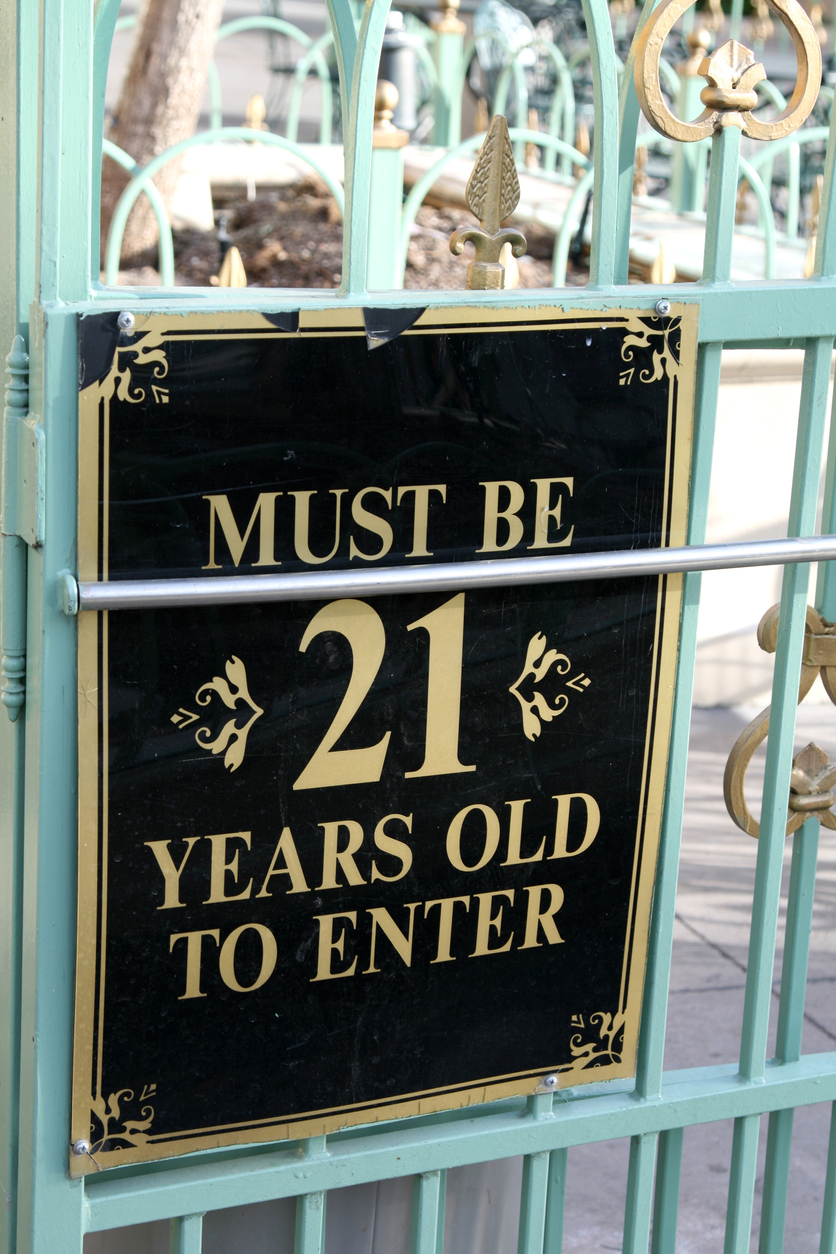The drinking age has long been a curious issue. Many feel that you should be able to legally purchase alcohol at 18 since you are able to vote, get married, enlist in the army, be drafted, and purchase tobacco products at that age. While the legal drinking age has been untouchable for some time, several states have filed bills that are ambitiously looking to change that. If these were to pass, those states would face serious financial ramifications.
How Did the Minimum Legal Drinking Age Come to Be?
The legal drinking age throughout the United States has fluctuated over the years. Before Prohibition, many states didn’t even enforce a legal drinking age. When Prohibition was repealed in 1933, most states set the legal drinking age at 21 to match the legal voting age at the time.
In 1971, The 26th Amendment was passed and lowered the voting age from 21 to 18. This led some states to lower the drinking age because they figured that if you were old enough to vote, you were old enough to drink.
The states that lowered the drinking age after the 26th Amendment’s adoption were:
- Alabama (1975: lowered to 19)
- Alaska (1970: lowered to 19)
- Arizona (1972: lowered to 19)
- Connecticut (1972: lowered to 18)
- Delaware (1972: lowered to 20)
- Florida (1976: lowered to 18, 1980: raised to 19)
- Georgia (1972: lowered to 18)
- Hawaii (1972: lowered to 18)
- Idaho (1972: lowered to 19)
- Illinois (1973: lowered to 19 for beer and wine)
- Iowa (1972: lowered to 19, 1973: lowered to 18, 1978: raised to 19
- Maine (1972: lowered to 18, 1977: raised to 20)
- Maryland (1974: lowered to 18 for beer and wine)
- Massachusetts (1973: lowered to 18, 1979: raised to 20)
- Michigan (1972: lowered to 18)
- Minnesota (1973: lowered to 18, 1976: raised to 19)
- Montana (1971: lowered to 19, 1973: lowered to 18, 1979: raised to 19)
- Nebraska: (1972: lowered to 19)
- New Hampshire (1973: lowered to 18, 1979: raised to 20)
- New Jersey (1973: lowered to 18)
- Oklahoma (1976: lowered to 18 for beer)
- Rhode Island (1970: lowered to 18)
- Texas (1973: lowered to 18)
- Vermont (1971: lowered to 18)
- Virginia (1974: lowered to 18 for beer and wine)
- West Virginia (1972: lowered to 18)
- Wisconsin (1972: lowered to 18)
- Wyoming (1973: lowered to 19)
This wave of lowering the drinking age led to a sharp rise in alcohol-related car accidents and fatalities, particularly between the ages of 16 and 20. Drunk driving was deemed a national health crisis and the National Institute of Health determined that 60% of all traffic fatalities were alcohol-related.
President Ronald Raegan decided to curtail this trend in alcohol-related accidents and fatalities by passing the Minimum Drinking Age Act in July 1984. The law mandated states increase the drinking age to 21 and “requires that States prohibit persons under 21 years of age from purchasing or publicly possessing alcohol beverages as a condition of receiving State highway funds.”
What Happens if a State Lowers the Drinking Age?
According to the Federal Highway Administration’s 23 U.S.C. 158 concerning the national minimum drinking age, “each state must have laws that prohibit the purchase or public possession of any alcoholic beverage by a person who is less than 21 years of age.”
The penalty for non-compliance with this statute means “withholding of 8 percent of the State’s apportionments for the National Highway Performance Program (NHPP) and Surface Transportation Block Grant Program (STBG).” Any funds withheld “lapse immediately.”
Why Do Certain States Allow Alcohol to be Purchased for Minors?
The states that allow adults to purchase alcohol for and consent to consumption by their minor children generally have approved those measures based on the idea of a “learner’s permit” for a driver’s license. Moderated consumption, in a controlled environment, and with proper supervision, is thought (by some) to help teach responsible consumption.
Which States Are Filing Bills to Lower the Drinking Age?
There are three states with recent bills addressing the drinking age. While these bills do not look to be going anywhere, it is curious that they would entertain the idea given the federal funding ramifications.
Illinois
Illinois recently filed HB 4021, which would reduce the age to purchase and consume alcohol (beer/wine/spirits) to 18. The legal age there is currently 21. The bill is currently stagnated and is not being discussed in committees.
South Carolina
South Carolina’s HB 3145 would allow beer and wine to be sold to, and possessed by, 18 years and older. It would also reduce the age to bartend, reduce the age to hold a permit, and reduce the age for DTC sales to 18. This bill is also stalled and doesn’t look to be moving anywhere soon.
Montana
Montana’s SB 366 is a little different and would have reduced the age to consume alcohol (beer and wine) in on-premises establishments to 18 as long as the minor’s parents were present. This bill is officially no longer advancing but would have matched existing laws in a few other states.
Can States Lower the Drinking Age?
Yes. The federal government cannot constitutionally mandate a federal minimum drinking age, leaving the door open for states to pass laws to lower the drinking age. However, it can strongarm states to adopt a 21-drinking age by dangling federal funding.
It is certainly not so cut and dry nationwide, and there are some exceptions to the rule. As seen with the new bills that have surfaced, some states are beginning to dip into the waters of lowering the drinking age.
Are There Any States Where it is Legal to Purchase Alcohol for Minors?
Purchasing alcohol for minors is generally considered illegal. However, some states have outlined specific caveats that allow you to legally purchase alcohol for minors and for minors to legally consume alcohol. Most of these caveats make the possession and consumption of alcohol legal for minors as long as their parent, guardian, or spouse who is of drinking age is present.
Let’s examine what some of those statutes look like.
Wisconsin
125.07 underage and intoxicated persons; presence on licensed premises; possession; penalties
(1) Alcohol beverages; restrictions relating to underage persons.
(a) Restrictions
“No person may procure for, sell, dispense or give away any alcohol beverages to any underage person not accompanied by his or her parent, guardian or spouse who has attained the legal drinking age.”
(3) Presence in places of sale; penalty.
(a) Restrictions
“An underage person not accompanied by his or her parent, guardian or spouse who has attained the legal drinking age may not enter, knowingly attempt to enter or be on any premises for which a license or permit for the retail sale of alcohol beverages has been issued, for any purpose except the transaction of business pertaining to the licensed premises with or for the licensee or his or her employee. The business may not be amusement or the purchase, receiving or consumption of edibles or beverages or similar activities which normally constitute activities of a customer of the premises.”
(4) Underage persons; prohibitions; penalties.
(a) Any underage person who does any of the following is guilty of a violation:
- Procures or attempts to procure alcohol beverages from a licensee or permittee.
- Unless accompanied by a parent, guardian, or spouse who has attained the legal drinking age, possesses or consumes alcohol beverages on licensed premises.
Texas
Chapter 106. Provisions Relating to Age
Sec 106.04 Consumption of Alcohol by a Minor
(b) “It is an affirmative defense to prosecution under this section that the alcohol beverage was consumed in the visible presence of the minor’s adult parent, guardian, or spouse. “
Sec. 106.05 Possession of Alcohol by a Minor
(b) A minor may possess an alcohol beverage:
- If the minor is in the visible presence of his adult parent, guardian, or spouse, or other adult to whom the minor has been committed by a court;
Sec. 106.06 Purchase of Alcohol for a Minor; Furnishing Alcohol to a Minor
(b) A person may purchase an alcoholic beverage for or give an alcoholic beverage to a minor if the person is:
- The minor’s adult parent, guardian, or spouse, or an adult in whose custody the minor has been committed by a court, and is visibly present when the minor possesses or consumes the alcoholic beverage.
Wyoming
Chapter 6 – Minors 12-6-101
- Any person who sells, furnishes, gives or causes to be sold, furnished or given away any alcoholic liquor or malt beverage to any person under the age of twenty-one (21) years, who is not his legal ward, medical patient or member of his own immediate family, is guilty of a misdemeanor.
Ohio
Ohio Section 4301.69 | Underage persons offenses concerning.
- Except as otherwise provided in this chapter, no person shall sell beer or intoxicating liquor to an underage person, shall buy beer or intoxicating liquor for an underage person, or shall furnish it to an underage person, unless given by a physician in the regular line of the physician’s practice or given for established religious purposes or unless the underage person is supervised by a parent, spouse who is not an underage person, or legal guardian.
- No person who is the owner or occupant of any public or private place shall knowingly allow any underage person to remain in or on the place while possessing or consuming beer or intoxicating liquor, unless the intoxicating liquor or beer is given to the person possessing or consuming it by that person’s parent, spouse who is not an underage person, or legal guardian and the parent, spouse who is not an underage person, or legal guardian is present at the time of the person’s possession or consumption of the beer or intoxicating liquor.
Nevada
NRS 202.020 Purchase, consumption or possession of alcoholic beverage by person under 21 years of age; penalties; sealing of records; exceptions.
1. Except as otherwise provided in this section, a person under 21 years of age who purchases any alcoholic beverage or consumes any alcoholic beverage in any saloon, resort or premises where spirituous, malt or fermented liquors or wines are sold is guilty of a misdemeanor and shall be punished by:
(a) Performing not more than 24 hours of community service;
(b) Attending the live meeting described in paragraph (a) of subsection 2 of NRS 484C.530 and complying with any other requirements set forth in that section; or
(c) Being required to undergo an evaluation in accordance with subsection 2 of NRS 484C.350, or any combination thereof.
2. Except as otherwise provided in this section, a person under 21 years of age who, for any reason, possesses any alcoholic beverage in public is guilty of a misdemeanor and shall be punished by:
(a) Performing not more than 24 hours of community service;
(b) Attending the live meeting described in paragraph (a) of subsection 2 of NRS 484C.530 and complying with any other requirements set forth in that section; or
(c) Being required to undergo an evaluation in accordance with subsection 2 of NRS 484C.350, or any combination thereof.
8. For the purposes of this section, possession “in public” includes possession:
(a) On any street or highway;
(b) In any place open to the public; and
(c) In any private business establishment which is in effect open to the public.
9. The term does not include:
(a) Possession for an established religious purpose;
(b) Possession in the presence of the person’s parent, spouse or legal guardian who is 21 years of age or older;
(c) Possession in accordance with a prescription issued by a person statutorily authorized to issue prescriptions;
(d) Possession in private clubs or private establishments; or
(e) The selling, handling, serving or transporting of alcoholic beverages by a person in the course of his or her lawful employment by a licensed manufacturer, wholesaler or retailer of alcoholic beverages.
Mississippi
- 67-3-54. Exemption for person over age 18 but less than 21; parental consent; military personnel; employee of establishment licensed to sell light wine, light spirit product or beer.
(1) A person who is at least eighteen (18) years of age but under the age of twenty-one (21) years may possess and consume light wine, light spirit product or beer with the consent of his parent or legal guardian in the presence of his parent or legal guardian, and it shall not be unlawful for the parent, legal guardian or spouse of such person to furnish light wine, light spirit product or beer to such person who is at least eighteen (18) years of age.
(2) A person who is at least eighteen (18) years of age and who is serving in the armed services of the United States may lawfully possess and consume light wine, light spirit product or beer on military property where the consumption of light wine, light spirit product or beer is allowed.
Connecticut
Sec. 30-89. Purchasing liquor or making false statement to procure liquor by person forbidden to purchase prohibited. Possessing liquor by minor on public street or highway or other public or private location prohibited; exceptions; when immune from prosecution.
(b) Any minor who possesses any alcoholic liquor (1) on any public street or highway, or (2) in any other public or private location, shall, for a first offense, have committed an infraction and for any subsequent offense, be fined not less than two hundred dollars or more than five hundred dollars.
(c) The provisions of subsection (b) of this section shall not apply to
(3) a minor who possesses alcoholic liquor while accompanied by a parent, guardian or spouse of the minor, who has attained the age of twenty-one.
Louisiana
- 93.13. Unlawful purchase of alcoholic beverages by persons on behalf of persons under twenty-one
- It is unlawful for any person, other than a parent, spouse, or legal guardian, as specified in R.S. 14:93.10(2)(a)(ii), to purchase on behalf of a person under twenty-one years of age any alcoholic beverage.
No Strong Push Towards Change Yet
While certain bills have been forwarded, nothing has come to fruition. Though, given the financial implications of lowering the drinking age, it is curious to see states teeing up legislation. States have changed their drinking age before, so there is nothing to say that it couldn’t happen again.
Special thanks to Erik Shaeffer, Manager of Regulatory Affairs, for research assistance.






